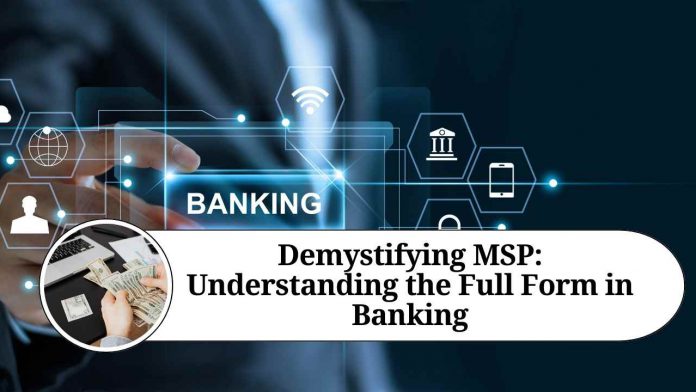In the realm of banking, numerous acronyms and abbreviations are used, which can often be confusing for those not familiar with the industry’s terminology. One such acronym is MSP, which holds significant importance in the banking sector. In this blog post, we will unravel the full form of MSP in banking and shed light on its meaning, relevance, and implications in the financial landscape.
MSP Defined:
MSP stands for “Merchant Service Provider” in the context of banking. A Merchant Service Provider is an entity that facilitates electronic payment processing for merchants, allowing them to accept various forms of payment, such as credit cards, debit cards, mobile wallets, and online transactions. MSPs act as intermediaries, connecting merchants with the appropriate financial institutions, payment networks, and technology platforms.
Role and Responsibilities of MSPs:
- Payment Processing: The primary function of an MSP is to enable seamless payment processing for merchants. They offer a range of services, including payment gateway integration, transaction authorization, settlement, and reporting.
- Technology Integration: MSPs provide the necessary infrastructure and technology solutions to connect merchants’ point-of-sale (POS) systems with payment networks. This integration ensures secure and efficient transmission of payment information during a transaction.
- Risk Management: MSPs play a crucial role in managing and mitigating payment-related risks, such as fraud and chargebacks. They employ various tools, technologies, and security measures to safeguard merchants and consumers from unauthorized transactions and fraudulent activities.
- Compliance and Regulation: MSPs ensure that their operations comply with the relevant banking regulations and industry standards. They assist merchants in meeting compliance requirements, such as Payment Card Industry Data Security Standard (PCI DSS) compliance, to enhance data security and protect sensitive cardholder information.
Benefits of MSPs for Merchants:
- Expanded Payment Options: By partnering with an MSP, merchants gain access to a wide array of payment methods, enabling them to cater to diverse customer preferences and enhance the overall shopping experience.
- Streamlined Operations: MSPs simplify payment processing procedures, allowing merchants to focus on their core business activities. They handle the technical aspects of payment integration, settlement, and reconciliation, reducing the administrative burden for merchants.
- Enhanced Security: MSPs employ advanced security measures to protect payment data, reducing the risk of data breaches and fraud. This instills customer confidence, improving trust and loyalty.
- Analytics and Insights: Many MSPs provide valuable transaction data and reporting tools, offering merchants insights into customer behavior, sales trends, and other metrics. This data can be leveraged for informed decision-making and business growth strategies.
Conclusion
In the world of banking, MSP stands for Merchant Service Provider, a vital entity that enables merchants to accept electronic payments seamlessly. These service providers play a crucial role in connecting merchants with financial institutions, managing payment processing, ensuring compliance, and minimizing payment-related risks. By partnering with MSPs, merchants can offer diverse payment options, streamline operations, enhance security, and gain valuable insights into their business performance. As the digital payment landscape continues to evolve, MSPs will remain integral to the banking industry, supporting the growth of businesses and facilitating secure and efficient payment transactions
Other Related Blogs: Section 144B Income Tax Act
Frequently Ask Question
Q1: What does MSP stand for in banking?
A1: MSP stands for “Merchant Service Provider” in the context of banking.
Q2: What is the role of a Merchant Service Provider (MSP) in banking?
A2: The role of an MSP in banking is to facilitate electronic payment processing for merchants. They connect merchants with financial institutions, payment networks, and technology platforms, enabling them to accept various forms of payment, such as credit cards, debit cards, mobile wallets, and online transactions.
Q3: What services do MSPs offer to merchants?
A3: MSPs offer a range of services, including payment gateway integration, transaction authorization, settlement, and reporting. They provide the necessary infrastructure and technology solutions to connect merchants’ point-of-sale (POS) systems with payment networks. Additionally, MSPs assist with risk management, compliance with banking regulations, and security measures to protect against fraud and unauthorized transactions.
Q4: How do MSPs benefit merchants?
A4: MSPs provide several benefits to merchants. They offer expanded payment options, allowing merchants to cater to diverse customer preferences. MSPs also streamline operations by handling technical aspects of payment processing, reducing administrative burden. With advanced security measures, MSPs enhance data protection and build customer trust. Additionally, MSPs provide valuable transaction data and reporting tools, empowering merchants to make informed business decisions.
Q5: What compliance standards do MSPs adhere to?
A5: MSPs ensure compliance with industry standards, such as the Payment Card Industry Data Security Standard (PCI DSS). This standard sets guidelines for safeguarding cardholder information during payment transactions. MSPs work closely with merchants to meet these compliance requirements, ensuring data security and minimizing risks.
Q6: Are MSPs only relevant for physical retailers, or do they support online businesses as well?
A6: MSPs are relevant for both physical retailers and online businesses. They facilitate payment processing for various channels, including traditional brick-and-mortar stores, e-commerce platforms, mobile applications, and online marketplaces. MSPs enable merchants across different sectors to accept electronic payments, regardless of their business model.
Q7: How can merchants choose the right MSP for their business?
A7: When selecting an MSP, merchants should consider factors such as the provider’s reputation, reliability, pricing structure, range of services offered, and compatibility with their existing systems. It’s advisable to evaluate multiple providers, compare their offerings, read customer reviews, and seek recommendations from trusted sources before making a decision.
Q8: Can merchants switch their MSP if they are not satisfied with the current one?
A8: Yes, merchants have the flexibility to switch their MSPs if they are not satisfied with the services provided. However, the process may involve technical considerations, such as integrating a new payment gateway and ensuring a smooth transition of payment data. Merchants should consult with the new MSP to understand the migration process and minimize any disruptions to their payment operations.
Q9: Are there any costs associated with partnering with an MSP?
A9: Yes, there are costs associated with partnering with an MSP. These costs may vary depending on the services required, transaction volume, and pricing structure offered by the MSP. Merchants need to have a clear understanding of the fees involved, including setup fees, transaction fees, and any additional costs associated with value-added services.
Q10: Can MSPs provide support for international payment processing?
A10: Yes, many MSPs offer support for international payment processing. They have partnerships and connections with global payment networks, allowing merchants to accept payments from customers located in different countries. Merchants should verify with the MSP regarding their capabilities and any specific requirements for international transactions.




















